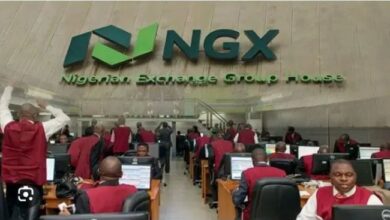What CBN’s Loan-to-deposit Ratio Policy Portends for Banking Sector by Zenith Bank MD
 The CEO of Zenith Bank Plc, Ebenezer Onyeagwu, speaking at the NSE Headquarters on Wednesday.
The CEO of Zenith Bank Plc, Ebenezer Onyeagwu, speaking at the NSE Headquarters on Wednesday.
The Chief Executive Officer of Zenith Bank Plc, Ebenezer Onyeagwu has explained the implications of the CBN’s loan-to-deposit policy for the banking sector in Nigeria.
It could be recalled that Nigerians have always complained of the refusal of banks within the country to loan out their deposits to boost small and Medium Enterprises and this has made Private Equity and Venture Capitalists popular among Nigerian start-ups.
As a way of meeting the demands of Nigerians on loan, the CBN Governor, Godwin Emefiele, had directed all Deposit Money Banks (DMBs) to lend out a minimum of 60% of their deposits.
Contrary to the claims that the CBN’s directive would be disturbing to the banking sector, the CEO of Zenith bank has said it has a positive implication.
Speaking during his introductory visit to the Nigerian Stock Exchange (NSE), Onyeagwu said the 60% lending of deposits wouldn’t impact negatively on the banking sector, rather, it would favour banks who are effective credit risk managers.
He also stated that the increment in loan-level would help build Nigeria’s economy as Small and Medium Enterprises (SMEs) and the retail sector would have more access to credit facility that would enable their growth and expansion.
READ ALSO: Zenith Bank Launches 2nd Edition of Lifestyle Fair Programme
According to PriceWaterhouseCoopers, SMEs contribute 48% of national GDP, account for 96% of businesses and 84% of employment in Nigeria.
Onyeagwu said banks were strict on offering loan in the past because of debtors’ act of evading servicing their debt. He said the attitude of borrowers had been unpleasant and remains one of key reasons fuelling bank’s refusal to give out more loans.
As a precautionary measure, it was learnt that banks have been considering technological ways to track debtors who try to default on loan payment by abandoning their banks to open accounts with other banks. Onyeagwu said the BVN had been instrumental in the loan recovery drive as it had helped banks to be more effective with credit control.
“With the BVN, this has helped in solving the problem of identity and the Banker’s Committee is working on building stronger capability into that.
“The capability that will enable us to enforce very effective and tight credit control such that if a customer takes a loan from Bank A and abandons it and goes to Bank B to open an account, with the BVN, such a customer can be traced. If the customer is owning Bank A N1 million and go to Bank B to open an account and deposit N2 million, electronically, the system will recover the money from the debtor. We believe this will help drive decent behaviour and promote good credit borrowers.”
Samson Oyedeyi


 The CEO of Zenith Bank Plc, Ebenezer Onyeagwu, speaking at the NSE Headquarters on Wednesday.
The CEO of Zenith Bank Plc, Ebenezer Onyeagwu, speaking at the NSE Headquarters on Wednesday.






